
Research
Energy Forward is dedicated to defining problems, creating solutions and implementing those solutions, while supporting our partners and community members.
We currently have a few projects underway that address each of those goals. Please check back to see updates on projects, and see our “Contact Us” page if you’re interested in pitching us a new project.
Defining the problem
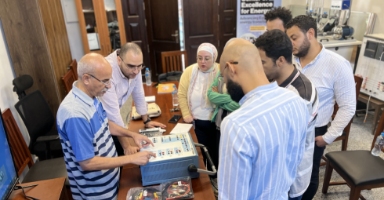
The Center of Excellence for Energy
The Center of Excellence for Energy aims to advance Egypt’s energy transition and help the country reach its goal of utilizing 42% renewable energy by 2035. The center is funded by USAID and operated by ASU in conjunction with three universities in Egypt — Ain Shams University, Mansoura University and Aswan University — as well as government and industry partners. This work will expand the capacity of Egypt’s higher education institutions to drive innovation, modernization and competition in the energy sector while also strengthening government policy around economic growth and Egypt’s energy challenges.
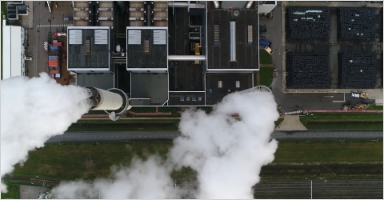
The Carbon Takeback Obligation: Cleaning up the fossil energy supply and accelerating the transition to non-fossil energy.
Fossil carbon products have supported global advancement and access to food, water and sanitation over the past century. However, this progress has come at the cost of accelerating climate change. While it is necessary to change behavior, increase energy efficiency and expand renewable energy use, there is also a need to account for the climate cost of fossil carbon production.
A novel energy policy, the Carbon Takeback Obligation, proposes adding the cost of carbon sequestration to fossil carbon business operations. This approach mandates a 1-to-1 payment, ensuring that for every unit of fossil carbon extracted, an equal amount is sequestered. By incorporating these costs, carbon-neutral fossil carbon products are made available to consumers, indirectly accelerating the shift to cheaper, non-fossil energy sources. This interdisciplinary project explores economic, legal, scientific and social aspects of the policy to provide design recommendations.
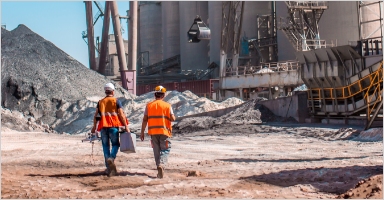
Portland cement
This project aims to revolutionize Portland cement production, which contributes to about 8% of global CO2 emissions. With projected cement output exceeding 6 billion tons by 2030, innovative solutions are crucial for sustainability.
The project introduces a solar-powered, two-stage process featuring low-temperature, carbon-neutral lime production and ultrafast cement synthesis. These methods enhance cost, energy and carbon efficiency. Additionally, advanced experiments and AI will optimize manufacturing, leading to sustainable cement innovations. An intuitive software tool will assist manufacturers, while a focus on education and workforce development will train the next generation of sustainable manufacturing experts.

HeatSuite
The HeatSuite pilot study, launched in May 2024, aims to better understand heat exposure, response and adaptation at an individual level in the Phoenix Metropolitan Area. Given that older people and/or those living in certain types of homes are also more vulnerable, there is a significant benefit in comprehending these fundamental differences better.
Participants who have reliable access to shelter and are over 45 years old receive small weather sensors — one for their home and another wearable version — and a smartwatch to collect data on indoor and outdoor temperatures, heart rate and skin temperature. The data collected also includes home surveys addressing various adaptive capacity factors, including cooling resources, and self-report smartwatch questionnaires. Participants simply go about their days as usual, accompanied by their smartwatch and small weather sensors. This survey will help identify individuals who meet the eligibility criteria and are willing to participate in further research activities.
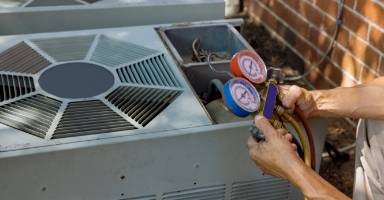
Air Conditioning Critical Infrastructure Project
The Air Conditioning Critical Infrastructure Project focuses on ensuring that Arizona’s first line of defense against extreme heat – air conditioning and its associated systems, organizations, and workforces – are capable of securing the state’s people and communities into the future and ensuring that no one is left behind.
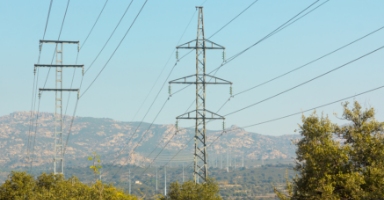
ASCENT: Sensor-enabled Wildfire Awareness and Risk Management (WARM) for Electric Power Infrastructure
The electric grid is susceptible to increasing wildfire risks, particularly in forested and rural areas. This is primarily due to a lack of risk awareness in such remote locations, which makes prevention and response management difficult. This NSF project addresses this problem by designing and testing a Wildfire Awareness and Risk Management (WARM) system that will use Internet of Things (IoT) wireless sensors to monitor the environment around remote electric power infrastructures and support resilient grid operation during high wildfire risk periods.
The project will bring transformative changes to the way power utilities, regulatory agencies and municipal managers react to wildfire threats by raising real-time situational awareness and developing strategies to increase options for rapid response and successful prevention.
These changes will be achieved by making advances in remote sensing, wireless communication, power system security analysis and optimization. The intellectual merit of this project lies in understanding, anticipating, measuring and mitigating wildfire risks associated with the electric grid. The sensor suites and risk management approaches developed through this project can have broader impacts in disaster mitigation, environmental monitoring and public safety.